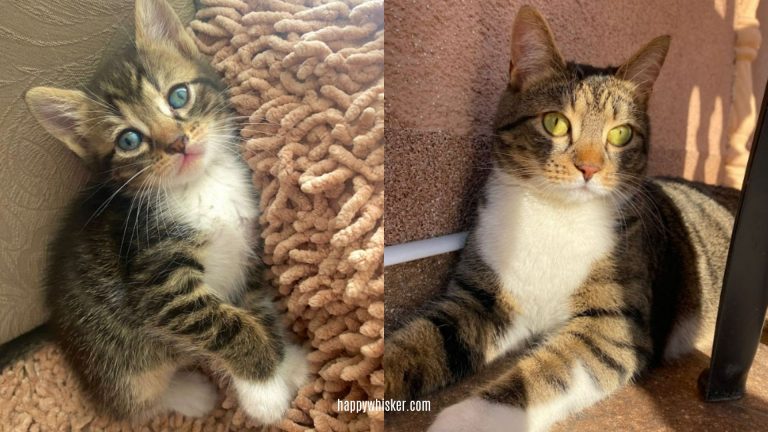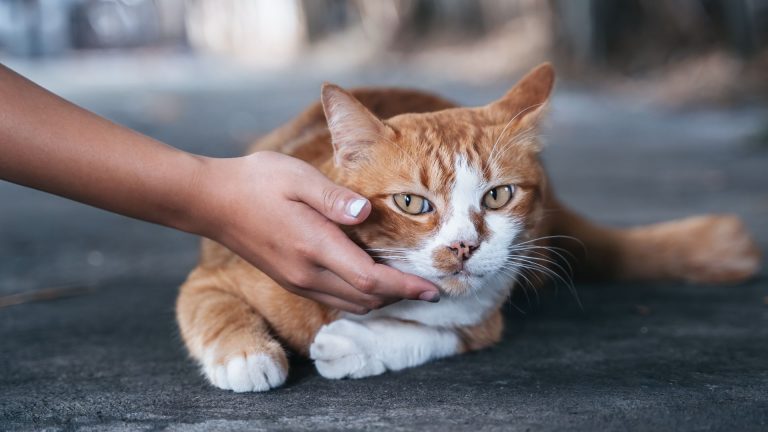Why Cats Have A Strange Reaction To Combs Explained
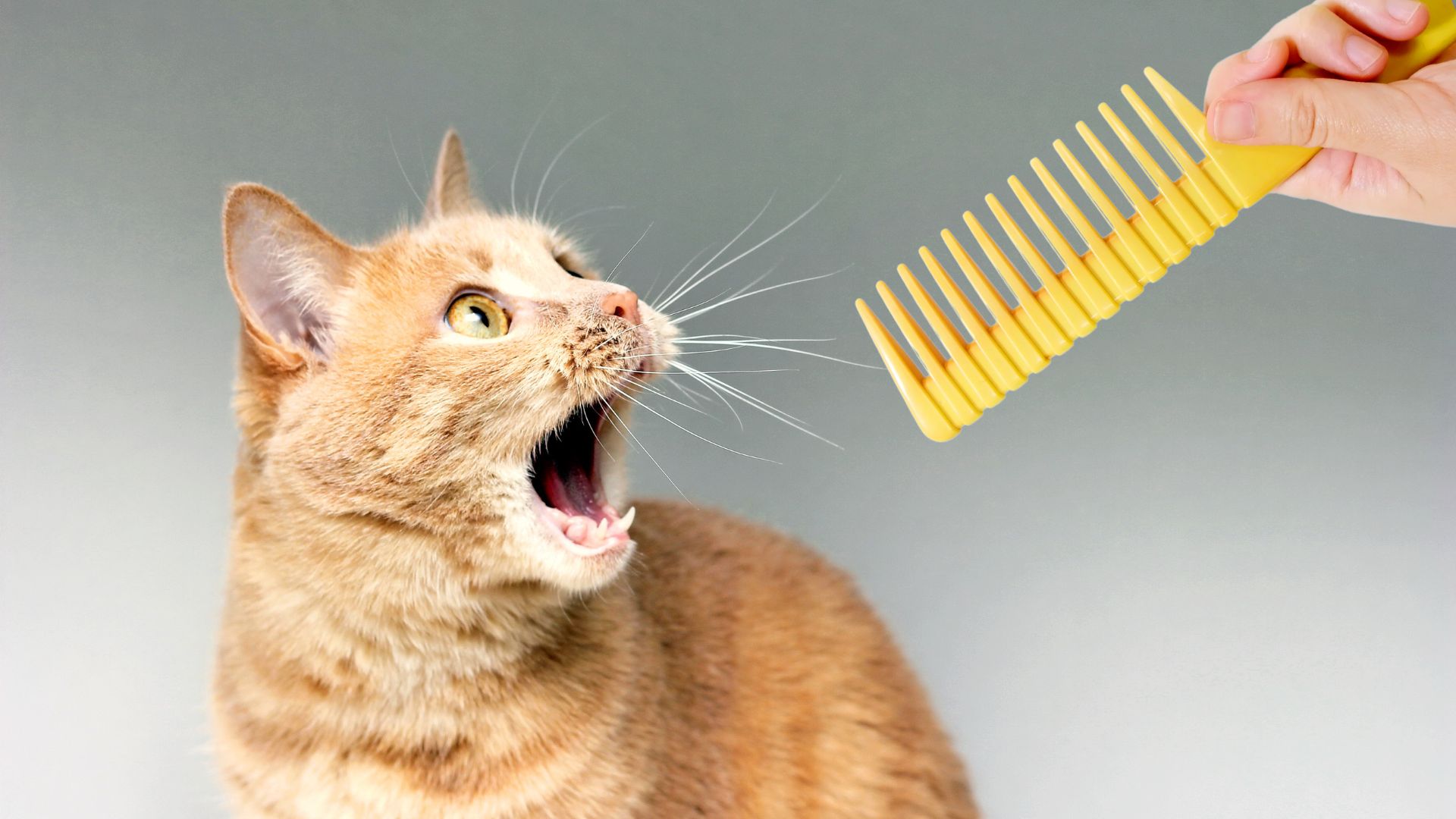
You might have heard that cats gag at the sound of a thumb going over a comb.
And that is true – cats absolutely hate the sound of running something across the teeth of a comb and they have a gagging response to it.
Some naughty people do it on purpose – just to annoy their cats for a second or two!
To a cat, the sound of something running across the teeth of a comb is like the sound of nails on a chalkboard for humans. But Why do cats gag at combs?
It turns out there is nothing to be worried about – it’s a normal reaction to high-frequency sounds!
I know it seems a bit strange but bear with me. I will explain everything you need to know about this strange cat behavior – just continue reading!
Why Do Cats Gag At Combs – A Strange Phenomenon

You might have run into a video of a cat gagging at combs. But, why do cats have this reaction to one specific movement?
It turns out this exact action produces a sound whose frequency is simply overstimulating for cats. It is so high in frequency that humans can’t even hear it since our hearing range does not go that high.
Cats are very sensitive to high-frequency sounds. They react to them by gagging, which is a reflex movement and not something they have control over.
But it is not a rule for all cats – some seem completely unbothered by this sound, while others absolutely hate it and will immediately gag on hearing it.
What Is Gagging In Cats?
It is not gagging nor sneezing, even though some people confuse the action with one of these two.
Gagging is an action that appears as if a cat is going to vomit, but never does. A cat stretches out its neck and opens its mouth as if it’s going to spit something out or maybe even vomit.
Gagging is used interchangeably with retching and dry heaving. All of them mean the same thing – a movement where it appears as if a cat is going to throw up, but doesn’t.
It is reflex motion (known as a gag reflex), which means a cat cannot actually control it – it just happens naturally.
It is a result of the contraction of the muscles found at the back of a cat’s throat. Its purpose is to prevent choking through something getting stuck in their airway, such as a piece of food or some foreign body.
Why Do Cats Gag At The Sound Of A Comb?

A cat will not specifically react to a thumb running over a comb, but rather to the high frequency sound the action creates.
No matter what causes the high-frequency sound, a cat will gag as a natural response to it.
There are two possible answers to why do cats react to the sound of a comb by gagging.
🐾 High-frequency sounds cause sensory overload
🐾 This sound had a specific frequency that caused the cat’s larynx (voice box) to vibrate
A Little Bit Of Science – Basics Of Frequencies
In order to fully understand why do cats gag at combs, let’s first cover some basic concepts of frequency and hearing range.
For Humans
The sound frequency range detectable by the human ear is from 20 Hz — 20,000 Hz.
A person cannot hear a sound at a frequency that is higher or lower than the given range. For example, a sound frequency of 25 000 Hz will not be picked up by the human ear.
Ultrasonic sounds are sounds that are greater than the upper limit of human hearing.
For Cats
Cats can detect sound in the frequency range anywhere between 48 Hz – 85,000 Hz.
As you can conclude, cats can hear far more sounds than humans, considering their hearing range is greater.
Cats have ultrasonic hearing but do not use ultrasonic sounds in communication with other cats or humans. For example, cat purrs have a frequency range of 25 Hz – 140 Hz.
Rats, mice, and bats are famous for using ultrasonic communication,
For Dogs
Dogs’ hearing range lies within the 67 Hz – 45,000 Hz frequency range. So, dogs can hear ultrasonic sounds.
As you can see, cats have, by far, the best hearing out of the three compared species.
Dogs lie somewhere in between the human’s and cat’s hearing sensitivity – they can hear more sounds than humans, but less than cats.
A Bit More Science – Cat’s Amazing Sense Of Hearing
The feline sense of hearing is far better than that of humans or dogs (and any other mammals). Apart from being able to hear high-frequency sounds, cats can also very precisely detect the direction and from how far away a sound is coming from! How amazing is that?
Did You Ever Notice Your Cat Hear Something You Didn’t?
Have you ever experienced your cat cuddling in your lap and then suddenly standing up and turning in a particular direction, while you’re just there wondering what’s going on with them?
Well, this is a perfect example of your cat hearing something you cannot hear. That’s why the cat turned around, while you remained oblivious.
Cats Use Ultrasonic Hearing While Hunting
Cats use their ultrasonic hearing abilities while hunting.
The cat’s ability to detect high-frequency sounds means survival in the wilderness. That’s how cats detect the presence of prey and how and where they’re moving.
Rats and mice create high-pitched sounds, which cats can detect. As you already know, rats and mice are common prey for a cat, so a cat can “eavesdrop” and easily find the prey’s location.
How Do Cats React To High-Frequency Sounds?
Cats do not like loud and sudden noises, or those with very low or very high-frequency sounds. Older cats are more likely to have more severe reactions to high-frequency sounds, but younger cats show behavioral changes too.
High-frequency sounds cause stress and anxiety for the cat. Some cats just really don’t like them and find them annoying, while others can even experience seizures as a response to them!
What Is FARS?
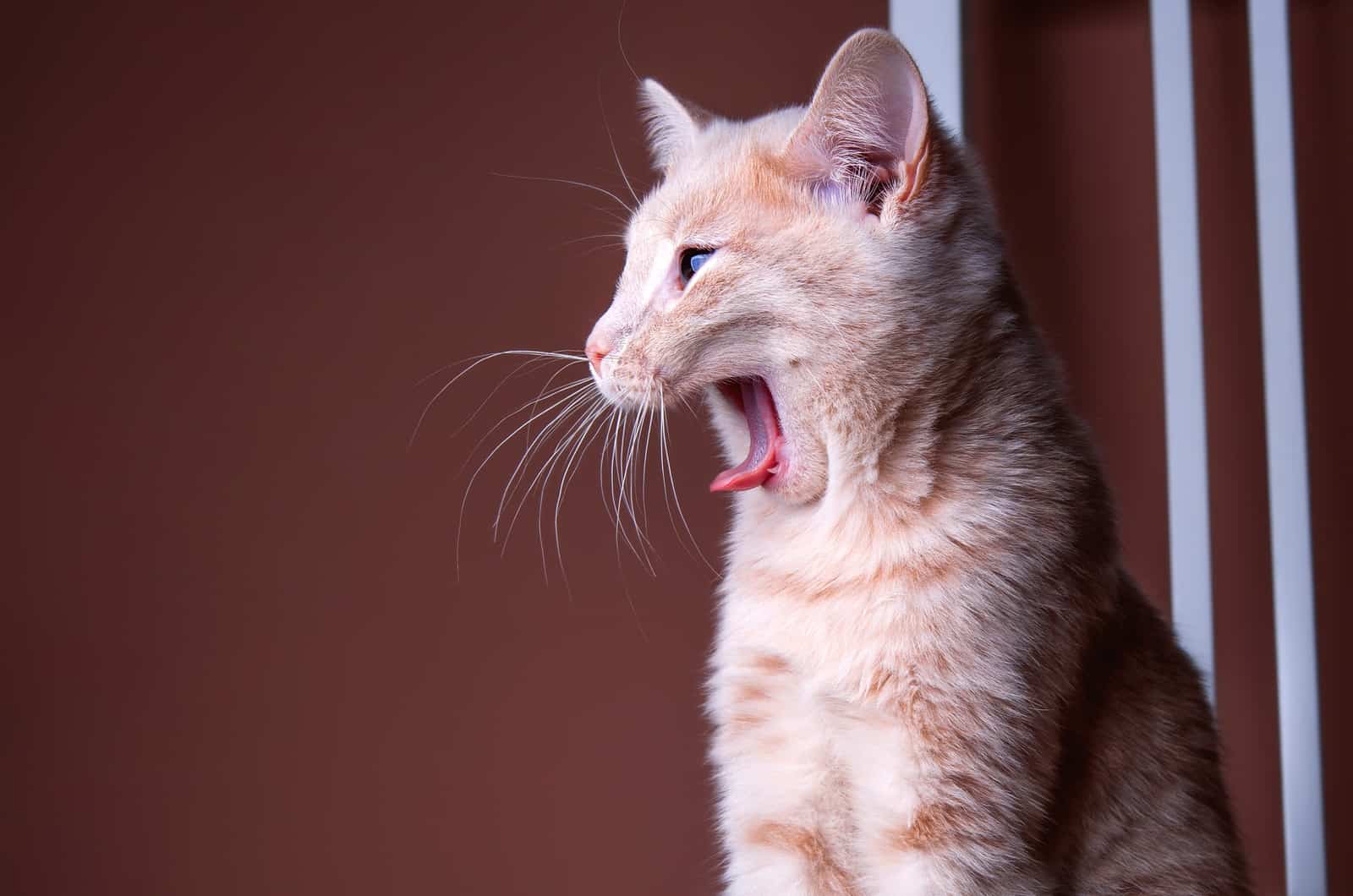
FARS is short for Feline Audiogenic Reflex Seizure and it is a type of epilepsy in cats.
It is common in old cats and some cat breeds are more susceptible to this condition, such as Birman cats and Birman mixed-breed cats.
What Are The Characteristics Of This Condition?
This condition makes the cat’s hearing overly sensitive to high-frequency sounds.
As a cat ages, it starts losing its hearing which is perfectly normal. The ability to hear low-frequency noises gets lost first.
It is thought that a cat’s extreme reaction to these sounds arises from the inability to hear “normal sounds and noise”, so they get startled and scared when they hear a sudden and very high-frequency noise. Normal cats would react to it, let alone cats that don’t hear very well.
One of the main characteristics of this condition is that the seizure stops as soon as the noise stops!
Why Is FARS also known as The Tom And Jerry Syndrome?
We all know who Tom and Jerry are and I’m sure all of us absolutely loved (and still love) this cartoon.
But have you ever noticed that in the cartoon the cat (Tom) has very sudden involuntary and extreme reactions to loud sounds?!
Well, in FARS, there is a type of seizure called myoclonic seizure and it strongly resembles Tom’s reaction to loud noises. That’s where the name Tom and Jerry Syndrome arises from.
What Triggers FARS? Which Sounds Make Cats Gag?
Here is a list of the most common triggers of FARS:
🐾 Sound of something running over a comb’s teeth
🐾 Sound of hammering a nail
🐾 Sound of keys clinking
🐾 Sound of typing on computer keys
🐾 Sound of rubbing paper bags
🐾 Sound of coins jingling
🐾 Sound of computer printers
🐾 Sound of a coffee grinder
🐾 Sound of running water
🐾 Sound of creasing aluminum or tin foil
🐾 Sound of crinkling paper
🐾 Sound of an alarm clock going off
It’s important to note that these sounds can trigger a gagging reflex in cats that do not necessarily suffer from FARS. It can be a normal reaction for a cat that hears a high-frequency sound but does not have this form of epilepsy.
What Are Some Symptoms Of FARS?
Here are some signs a cat is experiencing a reflex seizure:
🐾 Gagging
🐾 Foaming at the mouth
🐾 Jerking (making sudden, spasmodic movements)
🐾 Becoming restless
🐾 Suddenly freezing all of a sudden
🐾 Becoming aggressive
What To Do If Your Cat Has FARS?
Medications that reduce the symptoms of this condition are out there and work by reducing hypersensitivity
But the most important thing is to first determine if your cat really has FARS, or is it just over-sensitive to high-frequency sounds and loud noises. If you have an old cat, there is a high probability it is indeed FARS.
Of course, the most obvious answer is to reduce the number of high frequency noises in your household. This is very important for house cats, as they don’t have anywhere to escape from them.
What Are Some Other Reasons A Cat Might Gag?
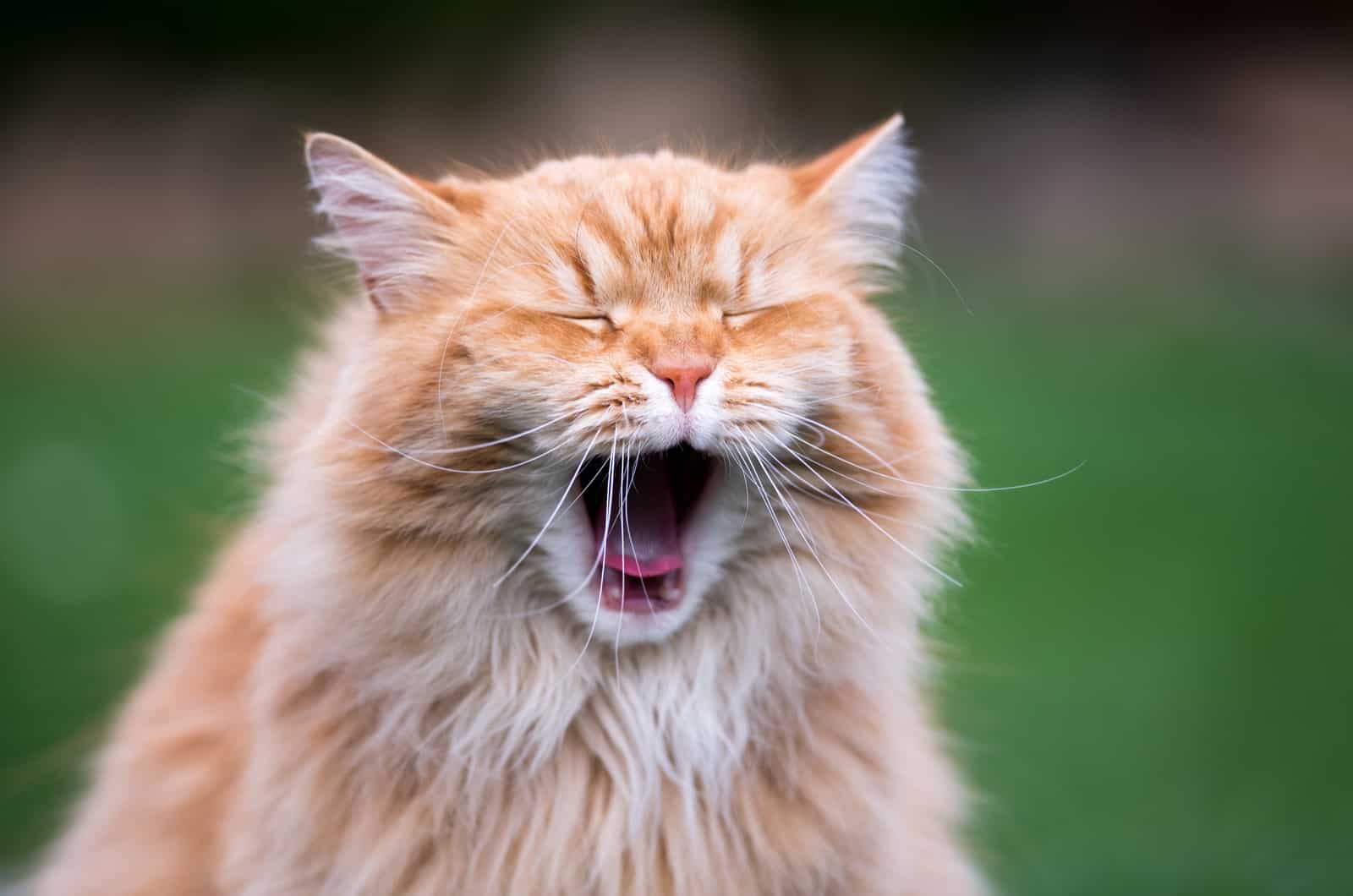
Now that I’ve explained why do cats gag at combs, let’s consider some other possible causes of a cat’s gagging reflex.
These include:
🐾 Something stuck in the cat’s throat.
Gagging is a natural reflex when something is stuck in a cat’s throat and the cat is trying to get rid of it. The same happens for humans and you might have experienced it yourself.
🐾 It’s because of a hairball.
Hairball is a collection of dead hairs that accumulate to form a mass in your cat’s stomach. The hair ended up there because of a cat’s constant grooming and licking its fur. The purpose of gagging is to make the cat cough up the hairball into the mouth to get rid of it.
🐾 The cat is eating too fast.
This happens when a cat is eating too much food too quickly. It does so at a rate at which their stomach cannot tolerate, so the response is gagging.
It does not necessarily end up with the food being thrown up, but it is a possibility. It will go away after the food settles into the stomach.
🐾 It’s because of the food.
The pieces of food might be too big for your cat to swallow, so the solution to this problem is providing your cat with food that’s cut up into smaller pieces.
Or maybe the taste of the food doesn’t sit right with the cat. Lemon is known to cause gagging.
🐾 It can be a symptom of an allergy.
There are other signs of an allergic reaction, but gagging can be one of them. An allergen can cause a cat’s throat to swell, triggering the gagging reflex. The throat “thinks” something is there, but it’s just the swelling.
🐾 The cat might have ingested something toxic.
If a cat has swallowed something poisonous, one of the symptoms can be a cat gagging. This will be accompanied by other symptoms that can help you determine if your cat has really been poisoned.
🐾 The cat might be nauseous.
If a cat is nauseous, it may experience gagging, alongside some other symptoms such as a change in mood, decrease in energy, etc.
🐾 It’s a symptom of a couple of diseases.
If a cat is gagging for a long period of time, it can be a sign something more serious is going on. If you observe your cat gagging for a prolonged period of time, make sure to visit the vet’s office.
Gagging can be a symptom of asthma, kidney disease, liver disease, heart disease, dental disease, viral, bacterial, or fungal infection.
What Should You Do When Your Cat Is Gagging?
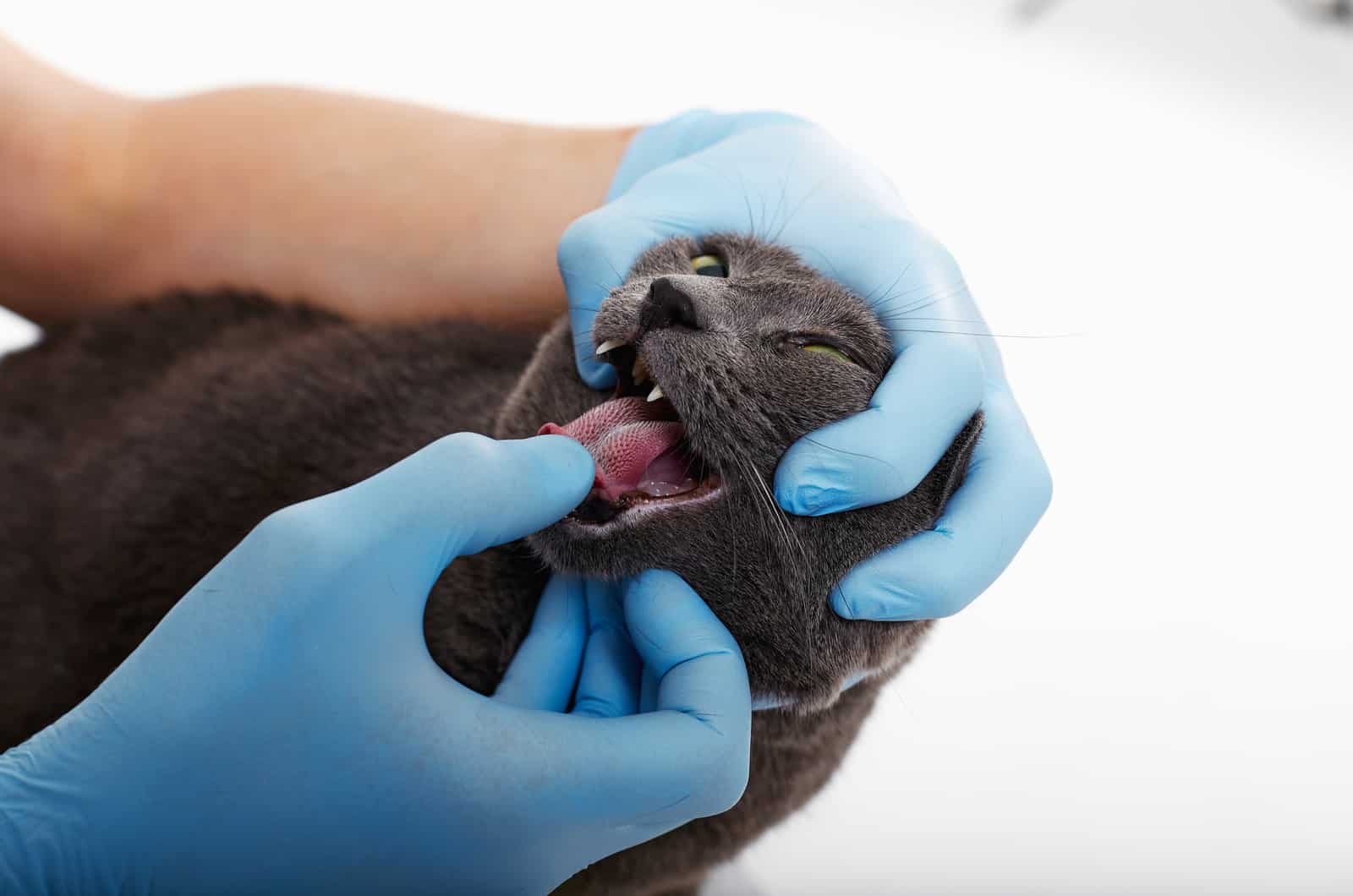
Well, there really isn’t much you can do. It should naturally stop after a short period of time. But if you notice it’s not stopping, try doing these:
🐾 Check the airway.
If it’s possible, try checking if any foreign object is stuck in your cat’s throat. This will help you find the cause of gagging.
🐾 Massage your cat’s throat.
The stroking action of your hands relaxes the cat’s throat muscles that are spasming at that moment. When the spasms stop, your cat will be able to swallow again.
🐾 Cover your cat’s nose.
This forces your cat to swallow whatever is stuck in the throat. Essentially, the thing that has stuck has to go either up or down. Considering your cat has not managed to force it up by gagging, you must help your cat swallow it.
🐾 Hairball medications are available.
If you know your cat’s gagging is caused by hairballs, there is something you can do, considering prohibiting grooming will surely not work.
Hairball medications are usually gels that lube your cat’s throat in order to facilitate easy movement through the throat and up into the cat’s mouth.
🐾 If you notice it happening frequently – visit the vet.
Gagging is not a normal cat behavior.
Can You Prevent Gagging?
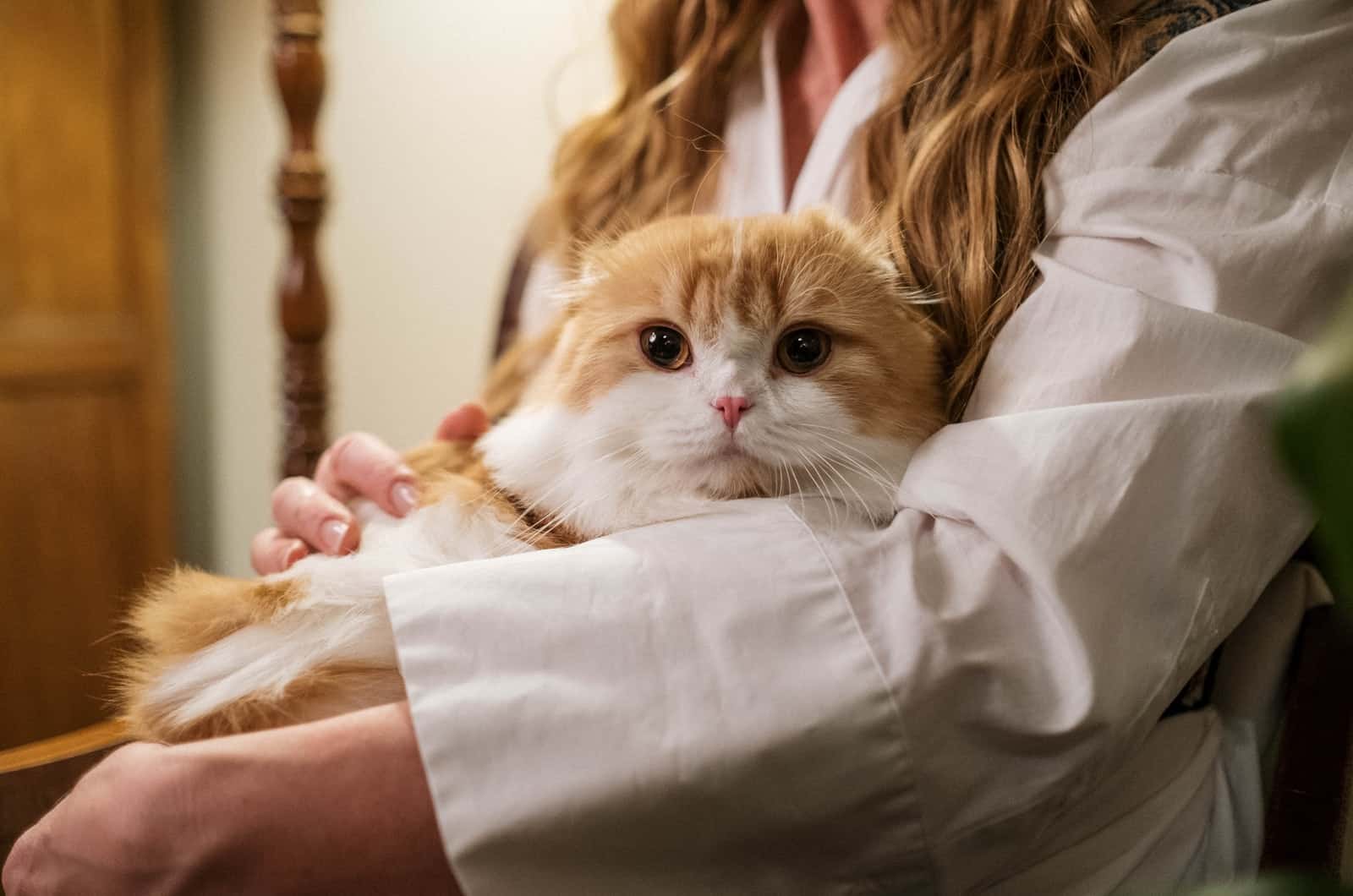
This depends on the reason your cat is gagging. For example, if your cat’s gagging is caused by heart disease – there’s nothing you can do to prevent it.
On the other hand, if the reason for gagging is much less serious, there might be something you can do.
🐾 Use laxatives that aid in passing the hairball out of your cat’s system (essentially by pooping).
🐾 Grooming your cat regularly will result in less hair ending up in your cat’s stomach and creating a hairball.
🐾 Make sure your cat’s food is not in big chunks, but rather in small pieces. This will prevent gagging caused by a piece of food stuck in your cat’s throat.
🐾 Discourage fast eating, as this can lead to gagging because there’s too much food entering the stomach. Use slow-feeder cat bowls that prevent fast eating and overeating.
🐾 If the gagging is due to swelling caused by allergies, make sure to find out what the allergen is, how to remove it from your cat’s environment, and what the possible treatment for it might be.
🐾 Find out if your cat has eaten something toxic which is making them gag. This is especially important for outdoor cats.
Should You Be Worried If Your Cat Gags?
In the majority of cases, the answer is no.
The only instance in which you should go to the vet is if you notice your cat’s gagging has become frequent. As a pet owner, you will surely notice if your cat starts gagging more than what’s considered normal.
Chronic gagging means there’s something going on with your cat’s health, such as heart disease, kidney disease or some sort of an infection.
These medical conditions are not to be taken lightly, so visiting the vet is the right thing to do.
What Are Some Other Sounds Cats Dislike?

Essentially, cats don’t like:
🐾 High-frequency sounds – coming from computers, TV, fluorescent light bulbs
🐾 Loud noises – sirens, garbage trucks, loud music, motorbikes
🐾 Sudden noises – thunder, doorbells, fireworks
🐾 Hissing – it is associated with danger and conflict
🐾 Common household noise – vacuum cleaner, TV, waste disposal
It might seem as if your cat is overly sensitive to a lot of things, but it’s something they deal with because they must.
Also, you cannot remove all noise in the world in order for your cat to be perfectly content. So, you should not worry about it but try minimizing the instances where your cat is around these sounds.
For example, put your cat in another room while you’re cleaning, don’t have parties with loud music in your house, and don’t make your doorbell the loudest bell ever.
What Sounds Do Cats Like?

After reading all about cats not liking different sounds, you might wonder: Do cats like hearing …anything?
Well, it turns out they do! Here is a short list of some sounds cats love hearing:
🐾 The sound of other cats meowing and purring
It sounds like cats love hearing members of their own kind. That’s sweet, don’t you think?
🐾 The sound their prey makes
Something we cannot be surprised by, cats are natural hunters after all!
🐾 The sound of nature
Sounds of nature are shown to be very relaxing and calming for many cats.
🐾 Classical music
This might come as a surprise, but cats seem to enjoy classical music, as a few studies show.
🐾 Women’s voices
Sorry boys and men, cats simply prefer women’s higher-pitched voices.
🐾 Sound of opening a food container, can, or a bag
We can’t blame them for this, right?
🐾 Sounds made by their toys
Considering playtime is one of your cat’s favorite activities, it’s no wonder the sound of toys is one of your cat’s favorite sounds.
In Conclusion
Cat owners – I know seeing your cat gag is not the most pleasant thing and may cause you to worry. But your cat gagging is nothing you should be alarmed about. It’s a normal reaction to something being stuck in your cat’s throat or it’s an attempt to dislodge an annoying hairball.
Although you might find it strange, cats also gag at high-frequency sounds. Us humans cannot hear them, but cats sure do and they don’t like them at all.
A popular example is a cat gagging at the sound of something running over a comb, or even keys jingling.
Sounds at a high frequency cause stimulatory overload for your cat, as well as make their voice boxes vibrate. The combined effects of the two result in the gagging reflex.
I hope this article answers your question why do cats gag at combs?
If you liked this article and you’re interested in some other odd cat behaviors, I suggest reading:
• Why Does My Cat Attack Me And No One Else – 7 Reasons & Fixes


